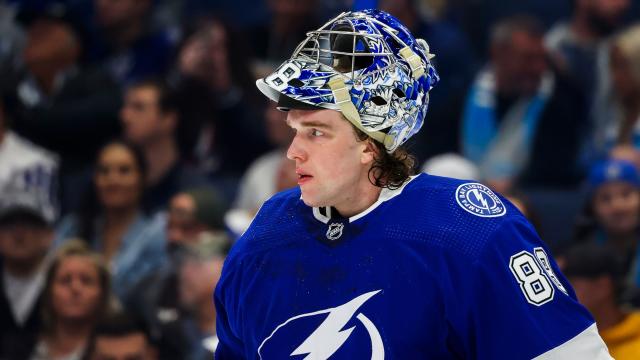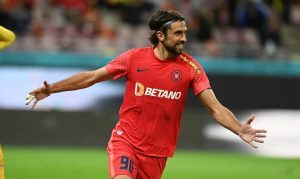
TAMPA — They shone once more for a single evening. It was as though the salary cap and free agency were really small parts in a larger story.
Nikita Kucherov was great, Brayden Point was quick, and Steven Stamkos was timeless for a single night in Raleigh, North Carolina. Andrei Vasilevskiy was healthy for one night during an 8-2 victory at Carolina, leaving the rest of the hockey world perplexed as to how this was possible.
for a single evening.
The Lightning still has a lot to prove. Vasilevskiy’s return to the Lightning after a month-long absence does not automatically mean that the team is returning to its previous level because we have witnessed far too many mistakes and on-ice messiness.
However, we have occasionally saw the promise, and on Friday night, we witnessed it fully realized, albeit with significant help from Carolina penalties. The question is whether Tampa Bay can maintain this level of intensity and defensive focus for more than a few games at a time.
As opposed to most, the Lightning have more enemies. In addition to the Maple Leafs, Panthers, and Bruins, they are up against their own recollections of themselves. They are assuming the expectations that come with winning 24 more postseason games than the next closest team in your conference over the previous six years.
However, this team is very different from the Lightning of the previous past. The flat pay cap has taken away the depth, and it is difficult to recreate the fast-paced accuracy that originates from a bunch of skaters who grew up together.
It does not imply that they cannot advance to the conference finals or higher.
It just indicates that they aren’t the clear front-runner anymore.
Think of them as an ongoing project. Although the Lightning have participated in almost 100 postseason games over the previous six seasons, just roughly 50% of the players currently on the squad have never won a playoff series while wearing a Tampa Bay jersey. That’s a lot of fresh talent to incorporate into a particular playing style.
You may occasionally see it coming together. The Lightning are leading the Eastern Conference in goals scored per game, averaging 3.71, which is a record high since 2018–19. Sometimes you question whether the parts will ever come together. They are conceding the second-highest amount of goals per game in the conference and the most they have allowed since Jon Cooper took over.
Furthermore, don’t think that Vasilevskiy, 29, is the only solution to their defensive problems. He improves them, without a doubt. After all, he is the only NHL goalkeeper currently playing who has both a Vezina and a Conn Smythe in his duffel bag. The truth is that Vasilevskiy is not much different from backup Jonas Johansson except that sometimes he will steal a game that the Lightning had no right to win.
But Vasilevskiy offers consistency most of the time. It was almost as though the team was lacking his safety net. Ever since he made his full-time starting debut in 2015–16, the Lightning have scored 1.39 points per game on average. The Lightning have scored 1.26 goals per game on average while other goalies have been in the net. While that is undoubtedly a big difference, the season won’t change as a result.
Eliminating many of the excellent, high-end scoring opportunities that the Lightning have given up throughout the first month is the bigger problem. Vasilevskiy is unable to address the absurdly high goal total on his own; it has more to do with skaters than goaltending.

This primarily concerns turnovers that result in rushes. It’s more about forwards getting lost in front of the net. More important is for forwards to retake defensive positions and for defensemen to move out of position. It all comes down to playing with a lead and knowing when to take a chance.
The Lightning are in a postseason spot this morning if you go by points percentage. Not a great seed, but not terrible for a squad starting a lot of new players and without its goalie. They are, to be honest, quite near to their proper location.
They are inadequate, though. They aren’t playing the kind of hockey that will win them games in the postseason, despite their 4-0-1 record over the last ten days. And the 61 games that follow will center around that. They want to keep playing quickly, but they don’t want to give up those ten to fifteen minutes each night to play defense.
That Friday evening in Raleigh, they did.
Is it something they can continue?








